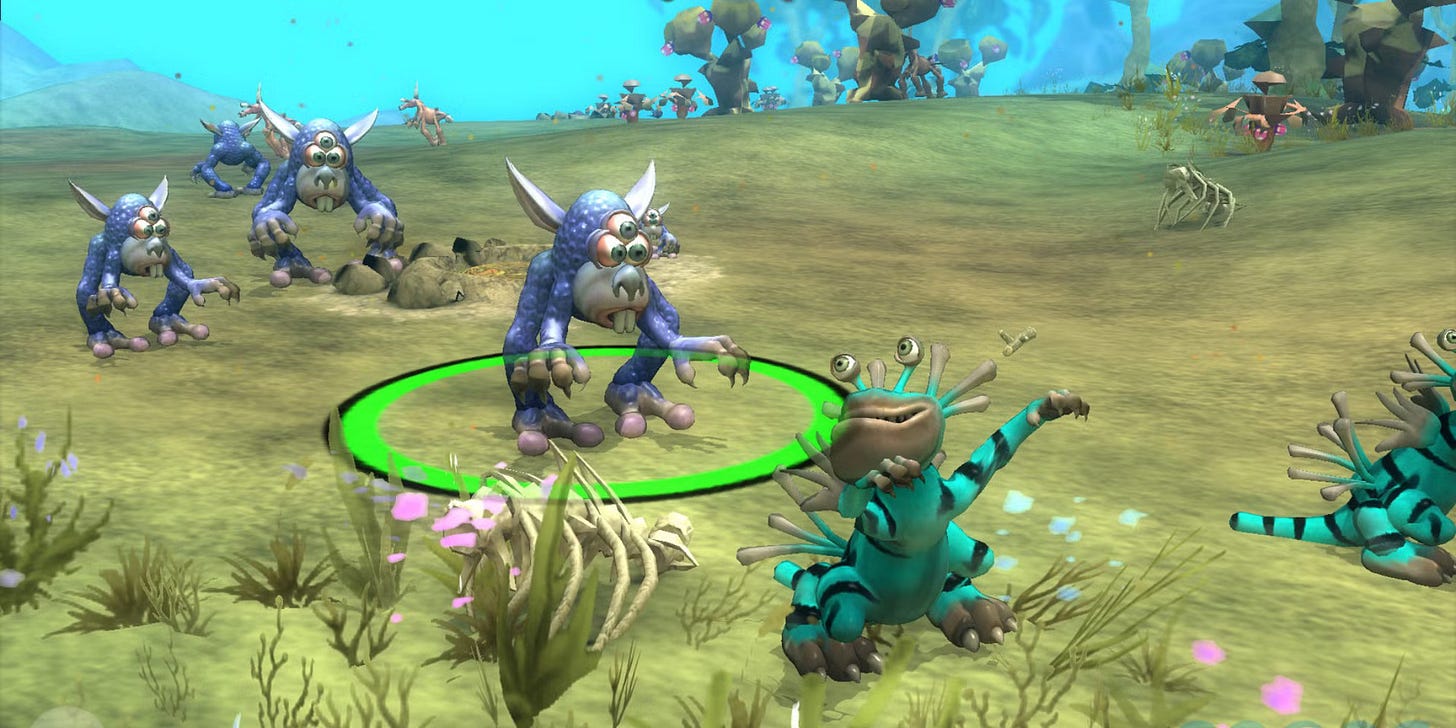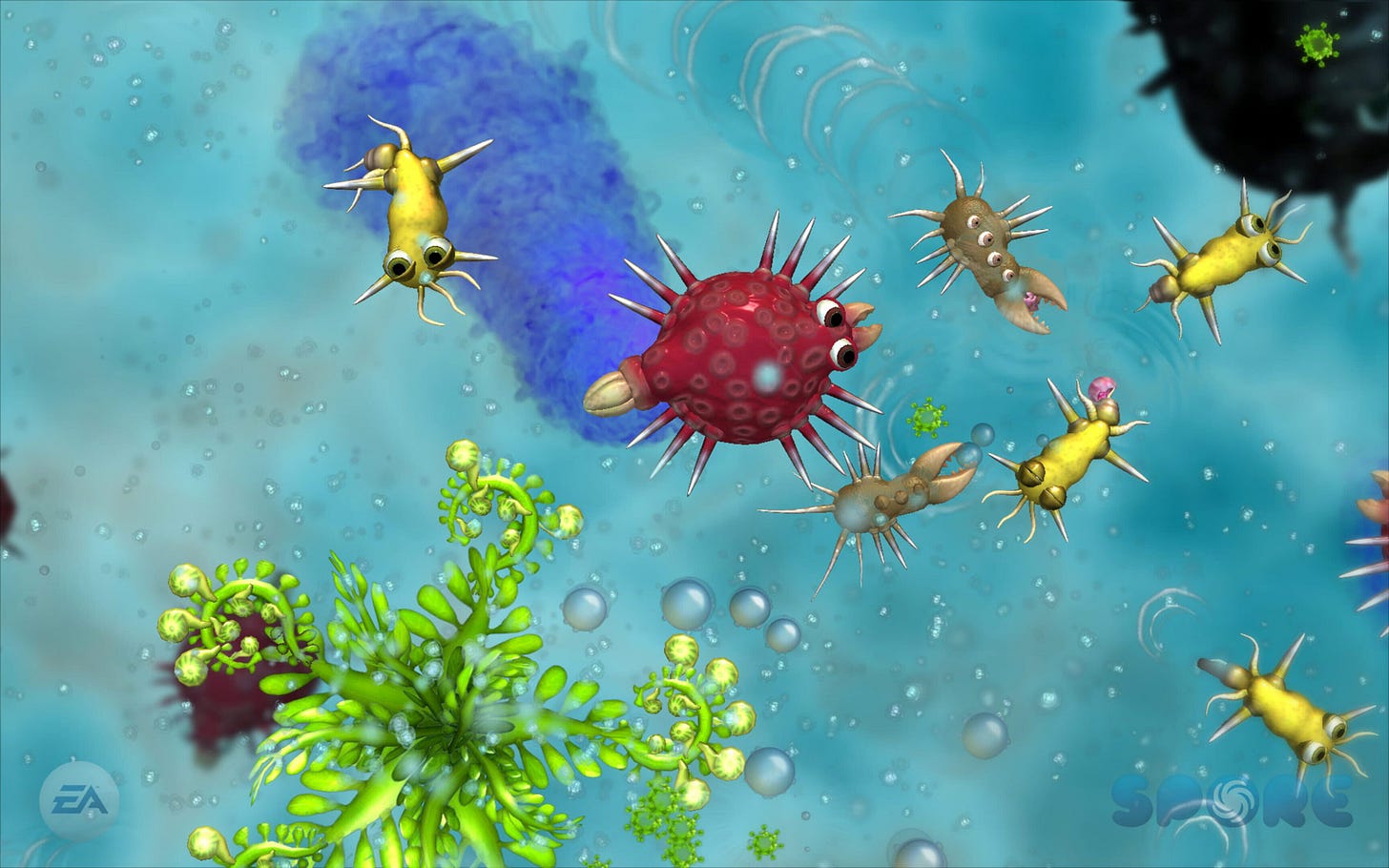Spore as a Digital Laboratory: Exploring the Foundations of Speculative Societal Construction
The 2008 video game Spore, designed by Will Wright, transcends traditional game design by functioning as a sandbox for simulating the evolution of life and society. While often celebrated for its creative flexibility and scope, Spore’s deeper significance lies in its role as a philosophical and technical case study. By allowing players to guide a species from microscopic beginnings to interstellar civilization, the game unintentionally models how speculative lifeforms might construct societies. Through emergent gameplay mechanics grounded in evolutionary biology, systems theory, and social philosophy, Spore becomes a digital laboratory for exploring the dynamics of societal formation.
Cooperation, Competition, and the Emergence of Social Structures
At its core, Spore’s societal mechanics revolve around the interplay of cooperation and competition—a duality central to both biological evolution and sociological theory. In the Tribal Stage, players transition from managing an individual creature to overseeing a fledgling society, where survival depends on strategic resource allocation and intertribal diplomacy. The game enforces a simple but powerful principle: societies flourish through either aggressive dominance or cooperative alliances, echoing the evolutionary truth that cooperation boosts group fitness, while competition spurs innovation.
Will Wright highlighted this dynamic, noting, “Evolution is this interplay between competition driving cooperation, driving specialization, which then brings the competition to the next level.” In the game, this philosophy materializes as players equip tribes with tools for warfare (like spears) or diplomacy (such as musical instruments)—digital analogues of real-world technologies from military defense to cultural exchange. As players advance to the Civilization Stage, they must unify cities through economic, religious, or military means, a process that parallels the real-world evolution of statecraft.
Unlike deterministic models, Spore emphasizes adaptability. Success depends on players’ ability to respond to rival factions, limited resources, and shifting environments. This design reflects Karl Popper’s concept of "piecemeal social engineering," where incremental change—not utopian blueprints—shapes effective societies. For example, instead of conquering neighbors, a player might gradually establish trade networks, mirroring real-world reliance on economic interdependence to mitigate conflict.
Environmental Pressures and Niche Construction
In Spore, the environment is not a static backdrop but a dynamic agent in societal evolution. During the Creature Stage, species adapt to specific ecological niches: herbivores evolve camouflage to evade predators, while carnivores develop offensive traits. These evolutionary paths later shape societal development. For instance, a species evolved in a desert may prioritize water-management technology during the Civilization Stage—analogous to ancient Mesopotamia’s irrigation systems.
Procedurally generated planets amplify this ecological interaction. Each biome—desert, tundra, rainforest—poses unique challenges. A society born in a resource-scarce environment may adopt militaristic policies to secure oases, whereas one in a lush rainforest might develop cooperative systems to manage abundance. This mirrors the principle of niche construction, where organisms modify their environments, triggering feedback loops that influence their evolutionary future. In Spore, societal actions reshape the world in turn, creating recursive interactions between player choices and planetary systems.
Environmental volatility adds further complexity. Weather events—such as storms grounding aircraft or droughts collapsing agriculture—force technological innovation or social adaptation. These systems resonate with Jared Diamond’s thesis in Collapse, where environmental mismanagement precipitates societal decline. In Spore, overharvesting leads to ecological ruin, offering a cautionary lesson in sustainability.
From Tribal Ethics to Galactic Governance: The Evolution of Values
Societal development in Spore is not just technological but ethical. Early decisions—whether to raid or ally with rival tribes—have long-term consequences, influencing diplomacy and identity in later stages. A species that favors aggression in the Tribal Stage may struggle with trust in the Space Stage, limiting diplomatic options. This mirrors the concept of path dependence, where historical choices constrain future possibilities—a key idea in institutional economics and political science.
Spore formalizes this ethical trajectory through its alignment system. Civilizations gravitate toward economic, religious, or military ideologies based on earlier gameplay choices, unlocking corresponding technologies and interaction styles. Militaristic societies may develop planet-destroying weapons, while economic ones gain advanced terraforming abilities. These pathways echo Max Weber’s typology of authority—traditional, charismatic, and legal-rational—illustrating how societies legitimize power through force, belief, or wealth.
Crucially, Spore avoids moral binaries. A pacifist civilization can succeed but must invest heavily in defense or diplomacy to survive hostile encounters. This reflects the tension in real-world political realism, where idealism often contends with the harsh necessities of survival.
Emergent Complexity and the Limits of Control
Despite its segmented stages, Spore is governed by emergent complexity. Each game world is populated by procedurally generated species with distinct behaviors and traits, producing unpredictable ecosystems. Introducing a predator can destabilize food chains, forcing adaptation or migration. In the Space Stage, players confront alien empires with divergent ideologies, requiring diplomacy, espionage, and cultural negotiation.
This emergentism aligns with theories of complex adaptive systems, where simple rules give rise to sophisticated patterns. The game’s editors—for creatures, vehicles, and architecture—function like genetic algorithms, allowing iterative design and evolution. Successful designs were shared via the Sporepedia, a massive player-generated database akin to horizontal gene transfer in biology. Spore thus becomes a crowdsourced experiment in societal construction, where collective creativity shapes the digital universe.
Yet the game also underscores the limits of centralized control. Players can’t micromanage every detail; instead, they enact broad policies and respond to unfolding crises. This decentralized management reflects Friedrich Hayek’s critique of top-down planning, emphasizing the importance of localized knowledge and adaptive governance.
Conclusion: Spore as a Philosophical Instrument
Spore’s enduring relevance lies less in its gameplay realism than in its conceptual depth. By abstracting evolution and culture into interactive systems, the game serves as a speculative laboratory for testing ideas about cooperation, adaptation, and governance. Its insights are twofold:
Societies are cultivated, not constructed—shaped through incremental decisions, environmental interactions, and ethical legacies.
Complexity emerges from simplicity—basic dynamics like resource management and competition generate intricate social systems.
While Spore simplifies many real-world nuances, its value as a tool for speculative reflection is profound. It poses timeless questions: What defines a society? How do values evolve? Can cooperation overcome the pressures of conflict in shaping civilization?
In this light, Spore is more than a game—it is a meditation on the fragile, iterative process of societal development. As humanity explores artificial intelligence and interstellar colonization, the game’s digital ecosystems remind us that building societies is not a deterministic march but a delicate dance of adaptation, chance, and the constant negotiation between individual ambition and collective survival.





